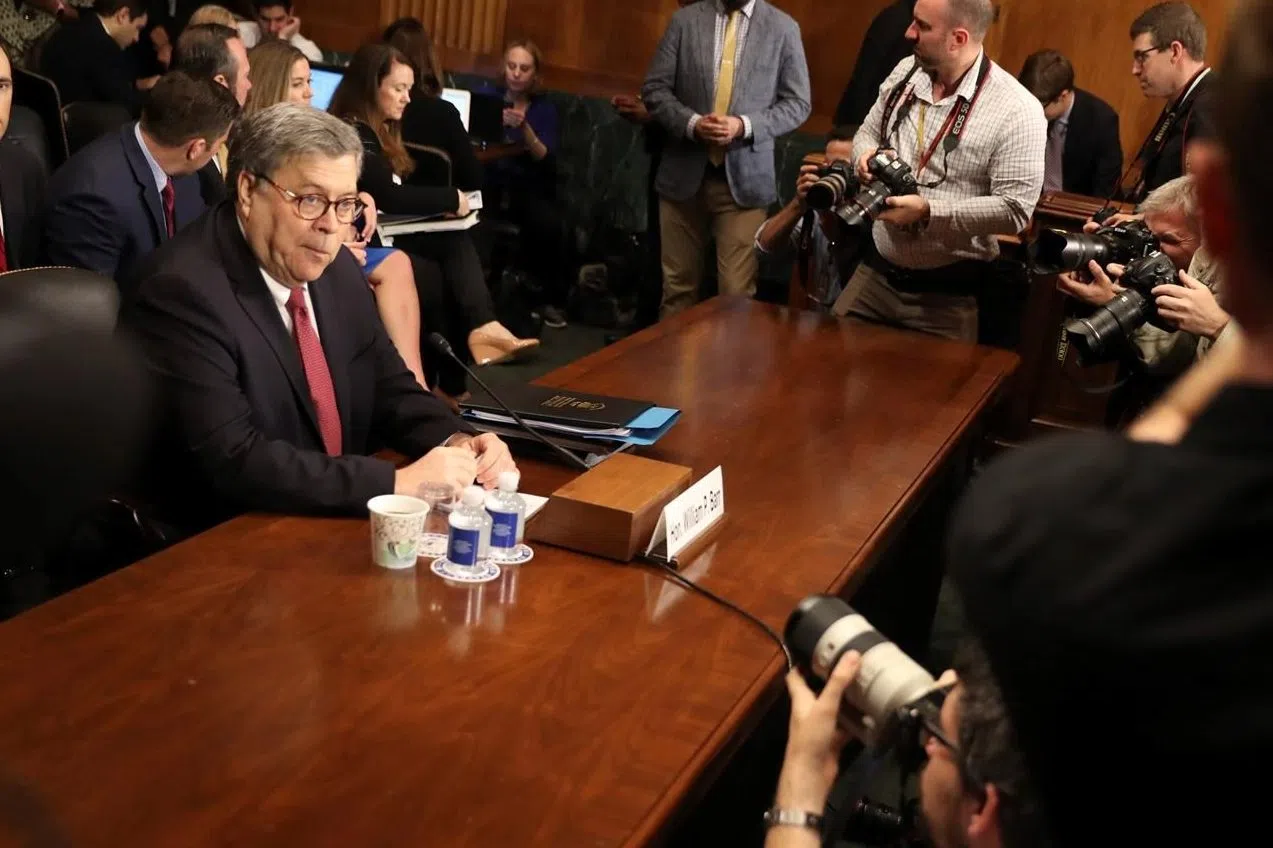WASHINGTON — Attorney General William Barr defended his handling of special counsel Robert Mueller’s Russia report on Wednesday amid new revelations that Mueller expressed frustration to Barr about how the attorney general was portraying the investigation’s findings.
Barr’s first appearance on Capitol Hill since releasing a redacted version of the report, presented a dramatic showdown as Democrats confronted him with allegations that he spun the investigation’s findings in President Donald Trump’s favour. Democrats were also likely to accuse him of misleading lawmakers last month when he suggested he was unaware of concerns on the Mueller team about his actions.
Barr’s appearance Wednesday before the Senate Judiciary Committee highlighted the partisan schism around Mueller’s report and the Justice Department’s handling of it. It gave the attorney general his most extensive opportunity to explain the department’s actions, including his press conference held before the report’s release, and for him to repair a reputation bruised by allegations that he’s the Republican president’s protector.
Barr noted in his prepared testimony Wednesday that Mueller concluded his investigation without any interference and that neither the attorney general nor any other Justice Department official overruled the special counsel on any action he wanted to take. Barr also defended his decision to step in and clear the president of obstruction of justice after Mueller presented evidence on both sides but didn’t reach a conclusion.
“The Deputy Attorney General and I knew that we had to make this assessment because, as I previously explained, the prosecutorial judgment whether a crime has been established is an integral part of the Department’s criminal process,” Barr said in his testimony.
A major focus of the hearing was sure to be the Tuesday night revelation that Mueller told Barr, in a letter to the Justice Department and in a phone call, that he was frustrated with how the conclusions of his investigation were being portrayed.
Mueller’s letter, dated March 27, conveys his frustration that Barr released what the attorney general saw as the bottom-line conclusions of the special counsel’s investigation and not the introductions and executive summaries that Mueller’s team had prepared and believed conveyed more nuance and context than Barr’s own letter. Mueller said he had communicated the same concern two days earlier.
“The summary letter the Department sent to Congress and released to the public late in the afternoon of March 24 did not fully capture the context, nature, and substance of this Office’s work and conclusions,” Mueller wrote.
“There is now public confusion about critical aspects of the results of our investigation. This threatens to undermine a central purpose for which the Department appointed the Special Counsel: to assure full public confidence in the outcome of the investigations.”
At an unrelated hearing last month, Rep. Charlie Crist of Florida asked Barr about media reports of frustration within the special counsel’s office about the way the report’s findings were characterizing. Asked if he knew what those concerns referred to, Barr said, “No, I don’t.”
Barr also is invited to appear Thursday before the Democratic-led House Judiciary panel, but the Justice Department said he would not testify if the committee insisted on having its lawyers question the attorney general.
Democrats were likely to press Barr on statements and actions in the past six weeks that have exasperated them. The tense relations are notable given how Barr breezed through his confirmation process , picking up support from a few Democrats and offering reassuring words about the Justice Department’s independence and the importance of protecting the special counsel’s investigation.
The first hint of discontent surfaced last month when Barr issued a four-page statement that summarized what he said were the main conclusions of the Mueller report. In that letter, Barr revealed that he and Deputy Attorney General Rod Rosenstein had cleared Trump of obstruction of justice after Mueller and his team found evidence on both sides of the question but didn’t reach a conclusion.
Barr says he released the report on his own even though he didn’t have to under the special counsel regulations, and that doing so fulfilled a pledge he made at to be as transparent as the law allowed.
After the letter’s release, Barr raised eyebrows anew when he told a congressional committee that he believed the Trump campaign had been spied on, a common talking point of the president and his supporters. A person familiar with Barr’s thinking has said Barr, a former CIA employee, did not mean spying in a necessarily inappropriate way and was simply referring to intelligence collection activities.
He also equivocated on a question of whether Mueller’s investigation was a witch hunt, saying someone who feels wrongly accused would reasonably view an investigation that way. That was a stark turnabout from his confirmation hearing, when he said he didn’t believe Mueller would ever be on a witch hunt.
Then came Barr’s April 18 press conference to announce the release of the Mueller report later that morning.
He repeated about a half dozen times that Mueller’s investigation had found no evidence of collusion between the campaign and Russia, though the special counsel took pains to note in his report that “collusion” was not a legal term and also pointed out the multiple contacts between the campaign and Russia.
In remarks that resembled some of Trump’s own claims, he praised the White House for giving Mueller’s team “unfettered access” to documents and witnesses. He suggested the president had the right to be upset by the investigation, given his “sincere belief that the investigation was undermining his presidency, propelled by his political opponents, and fueled by illegal leaks.”
Eric Tucker And Mary Clare Jalonick, The Associated Press







